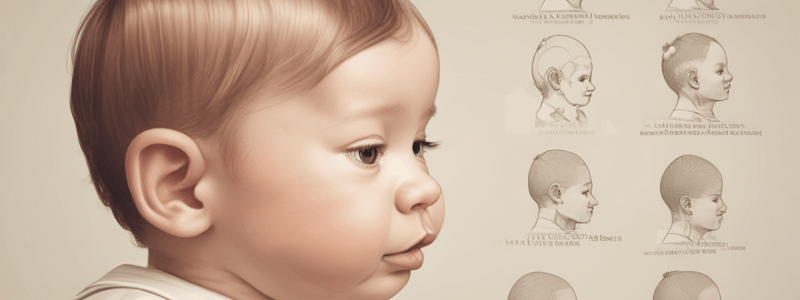Podcast
Questions and Answers
How should a provider assess an infant's head?
How should a provider assess an infant's head?
- By observing for symmetry and measuring circumference (correct)
- By using imaging techniques
- By measuring hair length
- By checking for ear alignment
What shape is the anterior fontanelle expected to be in infants?
What shape is the anterior fontanelle expected to be in infants?
- Round
- Diamond (correct)
- Square
- Triangular
What does a bulging fontanelle indicate in an infant?
What does a bulging fontanelle indicate in an infant?
- Normal growth
- Head trauma
- Intracranial pressure (correct)
- Dehydration
What is a common complication associated with low set ears in infants?
What is a common complication associated with low set ears in infants?
What is a potential sign of microcephaly in an infant?
What is a potential sign of microcephaly in an infant?
Which finding suggests a concerning visual issue in an infant?
Which finding suggests a concerning visual issue in an infant?
What is meant by 'milk bottle carries' in infants?
What is meant by 'milk bottle carries' in infants?
What is congenital torticollis?
What is congenital torticollis?
What is a sign of increased intracranial pressure that can be observed in infants?
What is a sign of increased intracranial pressure that can be observed in infants?
What is the typical result of caput succedaneum in newborns?
What is the typical result of caput succedaneum in newborns?
Which developmental change occurs in the heart shortly after birth?
Which developmental change occurs in the heart shortly after birth?
What condition is characterized by prolonged exposure to sugary liquids from bottles, leading to tooth decay in infants?
What condition is characterized by prolonged exposure to sugary liquids from bottles, leading to tooth decay in infants?
What is the main function of the patent ductus arteriosus during fetal life?
What is the main function of the patent ductus arteriosus during fetal life?
Which condition is indicated by low set ears in infants?
Which condition is indicated by low set ears in infants?
What might occur as a result of dehydration in infants?
What might occur as a result of dehydration in infants?
At what age do infants typically develop 20 deciduous teeth?
At what age do infants typically develop 20 deciduous teeth?
What is the significance of an infant's heart being proportionately larger than that of an adult?
What is the significance of an infant's heart being proportionately larger than that of an adult?
What is a condition where there is a collection of blood between the newborn’s skull bone and the periosteum?
What is a condition where there is a collection of blood between the newborn’s skull bone and the periosteum?
At what age do lymph nodes reach their maximum size?
At what age do lymph nodes reach their maximum size?
What fetal development occurs during the first 8 weeks of gestation?
What fetal development occurs during the first 8 weeks of gestation?
Why is central cyanosis considered abnormal in newborns?
Why is central cyanosis considered abnormal in newborns?
What is indicated by a difference in oxygen saturation of >2% between pre-ductal and post-ductal measurements?
What is indicated by a difference in oxygen saturation of >2% between pre-ductal and post-ductal measurements?
Which factor increases the risk of congenital heart disease in infants?
Which factor increases the risk of congenital heart disease in infants?
What key physical indicator can signal potential cardiac issues in general assessments?
What key physical indicator can signal potential cardiac issues in general assessments?
What is the significance of clubbing in assessing cardiac health?
What is the significance of clubbing in assessing cardiac health?
How does the size of an infant's heart compare to an adult's in relation to body size?
How does the size of an infant's heart compare to an adult's in relation to body size?
What is a characteristic of innocent murmurs in children?
What is a characteristic of innocent murmurs in children?
What is the role of the myocardium in cardiac function?
What is the role of the myocardium in cardiac function?
What can a difference of more than 2% between pre-ductal and post-ductal oxygen saturation measurements indicate?
What can a difference of more than 2% between pre-ductal and post-ductal oxygen saturation measurements indicate?
What does central cyanosis indicate in newborns?
What does central cyanosis indicate in newborns?
Which measurement aids in detecting a coarctation of the aorta?
Which measurement aids in detecting a coarctation of the aorta?
Which of the following indicates inadequate weight gain in children that may signal cardiac issues?
Which of the following indicates inadequate weight gain in children that may signal cardiac issues?
What does clubbing of fingers in children typically signify?
What does clubbing of fingers in children typically signify?
What is the significance of the point of maximum intensity (PMI) during a cardiac examination?
What is the significance of the point of maximum intensity (PMI) during a cardiac examination?
Which heart sound is considered abnormal and indicates decreased ventricular compliance?
Which heart sound is considered abnormal and indicates decreased ventricular compliance?
What does the presence of meconium aspiration at birth potentially indicate?
What does the presence of meconium aspiration at birth potentially indicate?
Which condition can frequent respiratory infections in children suggest?
Which condition can frequent respiratory infections in children suggest?
What does poor warmth and capillary refill in a child indicate?
What does poor warmth and capillary refill in a child indicate?
Flashcards are hidden until you start studying
Study Notes
Head Assessment and Conditions
- Assess an infant's head by examining size, symmetry, and shape.
- Newborn head circumference is typically 2-3 cm larger than chest circumference.
- Anterior fontanelle is diamond-shaped and flat; abnormalities include bulging or depressed signs.
- Fontanelles generally close by 18 months for the anterior and 6-8 weeks for the posterior, which is triangular in shape.
- Bulging fontanelle suggests increased intracranial pressure; depressed indicates dehydration.
- Caput succedaneum is a scalp swelling due to birth pressure, whereas cephalohematoma is blood accumulation between the skull and periosteum, both resolving on their own.
- Microcephaly presents a head circumference equal to or smaller than the chest; macrocephaly involves fluid accumulation in the ventricles.
Ear Assessment and Conditions
- Low set ears are abnormal; they can indicate potential kidney issues or syndromes.
- Speech and language delays may signal hearing loss in infants.
- The eustachian tube is short and horizontal in babies, raising the risk of otitis media.
- During an otoscopic exam, pull the ear down and back for children under 3 years old.
- Pneumatic otoscopy checks tympanic membrane mobility to assess middle ear conditions.
- Immobility may indicate fluid in the middle ear, perforation, or tympanosclerosis.
Eye Assessment and Conditions
- Sunsetting eyes in infants indicate increased intracranial pressure, often seen with hydrocephalus.
- Tears before 1 month are abnormal; end gaze nystagmus can be normal during eye movement tests.
- Asymmetry in corneal light reflex is typically normal in infants under 6 months.
- A red reflex absent in one eye could suggest retinoblastoma; 20/20 vision usually established post-age 6.
Nose Conditions
- Foul-smelling, purulent discharge may indicate a foreign body in the nose.
- Frontal sinuses are not fully developed until around age 8.
Mouth and Throat Assessment
- Milk bottle caries, also known as baby bottle tooth decay, occurs from prolonged sugary liquid exposure.
- Teeth emerge around 6 months (first lower central incisors) and continue until about age 12 with full eruption of permanent teeth.
- Maximal dental caries in infants can be normal at 3+.
Neck Assessment and Conditions
- Congenital torticollis results from tight neck muscles, causing head tilt.
- The easiest neck palpation occurs in the supine position.
- Lymph nodes reach maximum size around 10-12 years, while thyroid palpation is typically not possible in infants.
Cardiology Key Points
- Heart and great vessel development occurs between weeks 3-8 of gestation; the heartbeat starts by day 23 but is detectable by Doppler around 8 weeks.
- In fetal circulation, the placenta provides oxygen since the lungs are undeveloped.
- The patent ductus arteriosus (PDA) allows blood flow from the aorta to bypass underdeveloped lungs; it typically closes soon after birth.
- Infants have proportionally larger hearts compared to body size and distinctive heart sounds that are higher in pitch than adults.
- Cardiac output depends on heart rate/rhythm; myocardial muscle efficiency is reduced in infants, requiring external support for function.
- Prenatal factors for congenital heart disease (CHD) include maternal health issues; family history increases risk by 50%.
- Birth history, feeding patterns, weight gain, and developmental milestones are essential for assessing cardiac health in infants.
- Potential signs of cardiac issues include poor extremity warmth, delayed weight gain, signs of respiratory distress, and developmental concerns.
- Cyanosis presents differently; acrocyanosis is normal but central cyanosis in newborns indicates serious issues.
- Heart rate and rhythm assessment is crucial in pediatric evaluations, with all four extremity blood pressure measurements aiding in identifying coarctation of the aorta.
- Differences in oxygen saturation may indicate significant cardiac anomalies.
- The point of maximum intensity (PMI) helps locate heart position while assessing pulse characteristics reveals cardiovascular health.
- Heart sounds are best analyzed by varying the stethoscope's diaphragm and bell.
- Innocent murmurs are common in 30-50% of children, appearing clearly due to thinner walls and heart rate variability.
Congenital Heart Disease
- CHD prevalence in live births is significant; common types include defects characterized by altered hemodynamics.
- Kawasaki disease is distinct from other heart diseases; acute rheumatic fever symptoms feature sore throat and fever with various treatments.
- Heart structure involves three layers: pericardium (protection), myocardium (muscle function), and endocardium.
Studying That Suits You
Use AI to generate personalized quizzes and flashcards to suit your learning preferences.




